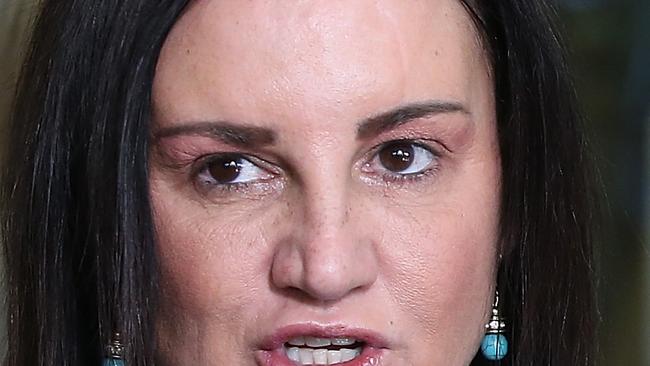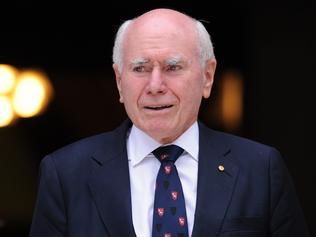
The Labor Party faces an agonising choice — whether to support the government’s full funding of the prized National Disability Insurance Scheme or to pretend, contrary to the budget reality, that the scheme is fully financed and doesn’t need any more money.
If you want to grasp the madness of our politics consider that Scott Morrison says the scheme is unfunded to $55.7 billion over the next 10 years, while Bill Shorten said yesterday “the NDIS was funded” and “I don’t accept that the NDIS or the disability insurance scheme isn’t funded”.
Got it? That’s a split over $55bn. It’s a split over whether there is any justification for an increase in the Medicare Levy to help fund the NDIS. It’s a split over political honesty and financial integrity.
The fallout is guaranteed to be bitter.
Social Services Minister Christian Porter has long done the numbers and said: “Labor never fully funded the NDIS. They left a $4bn annual funding gap in the NDIS from 2019-20 which grows each and every year. Labor’s claims that it ‘clearly identified’ enough ‘other’ savings to pay for the NDIS is a lie.”
The Labor leader needs to be extremely careful. The budget papers show the shortfall of $55bn in NDIS funding over the decade to 2027-28 and that the contribution from the rise in the Medicare Levy will provide $50bn over this period. In short, it will largely resolve the shortfall.
For Labor to pretend there is no existing problem is a fiscal fantasy.
The Treasurer held out an olive branch to Labor in parliament yesterday, saying he would meet them in the middle and settle the NDIS funding forever. Don’t hold your breath.
Morrison sounds sweet reason but, have no doubt, the politics are lethal. If Labor votes for the Medicare increase, it concedes that it didn’t fully fund the NDIS in office and that its claims on this front for the past four years have been fraudulent. There is no way opposition social services spokeswoman Jenny Macklin would tolerate that.
There is almost no other issue on which Labor is more dogmatic or emotional when it comes to its record in government.
A decisive clue came yesterday when former treasurer Wayne Swan said: “The NDIS was fully funded by Labor in the 2013-14 budget and the notion that we would increase the Medicare Levy to fund the NDIS is nothing but pure fiction.”
Swan said Morrison’s Medicare Levy increase was just a tax on people to pay for his budget mismanagement. But if Labor opposes or qualifies its support for the 0.5 per cent Medicare Levy increase, then it hands the government a powerful moral case — that a stubborn opposition refuses to properly fund the scheme to assist disabled Australians.
This would fuel Malcolm Turnbull’s case against Labor — that it doesn’t stand by its beliefs.
There is immense poetic revenge in what the government now proposes. It is doing to Labor exactly what Labor did to the Coalition in 2013. The final budget of the Gillard government proudly announced the disability scheme and its primary method of funding — a 0.5 per cent increase in the Medicare Levy to 2 per cent from July 2014 to raise $20.4bn between 2014-15 and 2018-19, and lifting thereafter. The principle was clear: the wider Australian community would share the burden for the disability scheme. This was considered to be fair and responsible.
The Turnbull government now adopts a similar stance.
Funding the NDIS is pivotal to the biggest budget measure, the 0.5-percentage-point increase to 2.5 per cent in the Medicare Levy raising $8.2bn — one fifth being to fund the NDIS by asking the public to contribute on behalf of the disabled.
If Labor decides it will seek to restrict Morrison’s levy increase to high-income earners, then it repudiates the position it took in office and will be branded hypocritical. The moral position is manifest: Labor was right in 2013 and any such funding should be a community or nationwide effort.
Porter repudiated Labor’s claims of “other” savings beyond the Medicare Levy increase that it set aside to fund the scheme. “Savings Labor now claims it made to help fund the NDIS went into consolidated revenue and were never set aside to fund the NDIS,” he said. “They were instead directed at an attempt to get back to surplus and ended up being washed away by Labor’s increasing cumulative budget deficits.”
In the 2013 budget Labor estimated a strong savings position and projected an average annual spending increase across the forward estimates of just 1.3 per cent in real terms, a figure later revealed to be a serious underestimate. The current budget papers show how the proposed NDIS shortfall would be met: the government would rely upon two funds, the DisabilityCare Australia Fund off the back of Gillard’s increase and the NDIS Savings Fund being proposed by Morrison off the back of the latest increase in the Medicare Levy.
Labor sources said last night the party would not give any blank cheque to the Medicare Levy increase. Yet the dilemma remains: there is a major NDIS funding shortfall and the government has proposed to resolve it by resorting to the same mechanism adopted by Labor in office. Morrison said the government had initially proposed to resolve the shortfall by budget savings but they had been rejected. The alternative is higher taxes. Are they also going to be rejected?





To join the conversation, please log in. Don't have an account? Register
Join the conversation, you are commenting as Logout